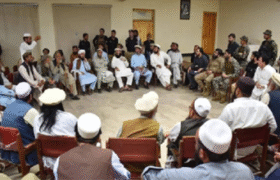A recent speech by Pakistan’s Army Chief has sparked debate after certain political groups launched a campaign against him. Addressing university students, the Army Chief emphasized the state’s resolve against elements challenging national security, stating that “those who incite unrest will be dealt with according to the Qur’anic orders.” He reiterated that the Pakistan Army continues to combat extremist threats and that the nation stands with its armed forces.
The speech was widely appreciated across various sections of society. However, some political factions, particularly Pakistan Tehreek-e-Insaf (PTI), have criticized the Army Chief, accusing the military leadership of political interference. The criticism has extended to international platforms, with PTI supporters staging protests in London during the Army Chief’s official visit to the UK. Despite efforts to mobilize demonstrations, the protests received limited support from overseas Pakistanis.
Additionally, PTI leaders, including Imran Khan and his close associates, have made various allegations against the Army Chief, ranging from claims of political victimization to accusations of interference in civilian affairs. On social media, a campaign against the military has intensified, with calls for international scrutiny.
Observers note that while political dissent is a democratic right, targeting the military leadership in such a manner risks undermining national security institutions. The government is being urged to address the growing trend of online disinformation and ensure that political discourse does not compromise the country’s stability.
The Pakistan Army remains a central pillar of the nation’s security, and the recent controversy highlights the ongoing political divide in the country. Moving forward, analysts emphasize the need for constructive political engagement rather than confrontation with state institutions.





